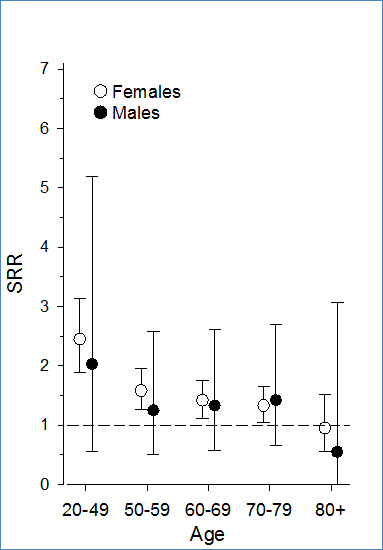Session Information
Session Type: Abstract Submissions (ACR)
Background/Purpose: Rheumatoid arthritis (RA) is associated with a wide set of comorbidities, including several autoimmune diseases such as autoimmune thyroiditis, which is a common cause of hypothyroidism. Whether the prevalence of hypothyroidism is elevated during the preclinical phase of RA when several autoimmune processes are already activated is not yet known. The aim of the study was to compare the prevalence of hypothyroidism among RA patients and non-RA-subjects at the time of RA diagnosis, and to determine whether the risk of hypothyroidism varies by age at the onset of RA, or by sex or rheumatoid factor (RF) status.
Methods: We identified 7,209 incident RA patients diagnosed between January 2004 and December 2007 from a Finnish nationwide register of special reimbursements for medication costs. The presence of hypothyroidism was identified from the same register based on special reimbursement decisions for thyroxine substitution. The prevalence of hypothyroidism at the onset of RA was compared to that of an age- and sex-matched Finnish population, and a standardized rate ratio (SRR) for hypothyroidism was calculated.
Results: The SRR for hypothyroidism preceding RA was 1.51; 95% confidence interval (CI): 1.35–1.67. The SRR was highest among younger RA patients, the excess prevalence of hypothyroidism decreasing steadily and wearing off among patients who were older at the time of diagnosis (Figure). The SRR for hypothyroidism was almost 2.5 among women between 20 and 49 years of age at RA diagnosis. The absolute prevalence of hypothyroidism, however, increased with age as it does in the general population. The SRR was similar between RF-positive and RF-negative patients: 1.46 (95% CI: 1.27–1.66) and 1.61 (95% CI: 1.34–1.91), respectively. Sex also did not modify the SRR point estimates, although the results did not reach statistical significance among men.
Conclusion: The prevalence of hypothyroidism is already increased among RA patients at the disease onset, especially among young women. This calls for attention to screening for hypothyroidism in younger RA patients. Furthermore, the clinician should be mindful of the possibility of RA as the underlying cause of joint symptoms in young female patients with hypothyroidism.
Figure. The standardized rate ratios (SRR) of hypothyroidism according to sex and age among 7,209 RA patients at disease onset compared with their age- and sex-matched non-RA equivalents. 95% confidence intervals are shown with whiskers.
Disclosure:
A. M. Kerola,
None;
T. Nieminen,
None;
M. J. Kauppi,
None;
H. Kautiainen,
None;
K. Puolakka,
None;
L. J. Virta,
None;
T. Kerola,
None.
« Back to 2012 ACR/ARHP Annual Meeting
ACR Meeting Abstracts - https://acrabstracts.org/abstract/increased-prevalence-of-hypothyroidism-preceding-rheumatoid-arthritis-an-epidemiological-study/

